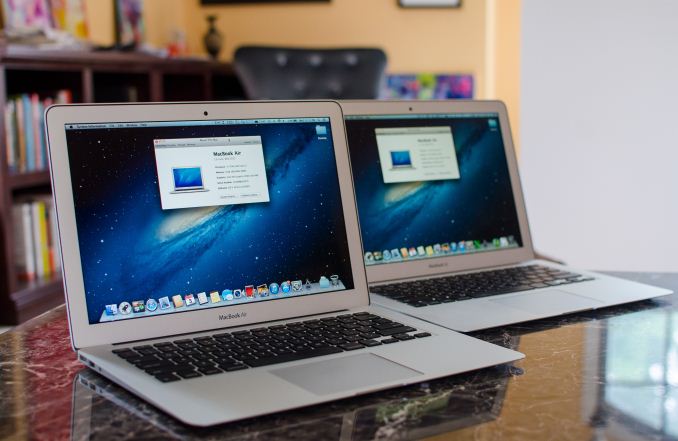The 2013 MacBook Air: Core i5-4250U vs. Core i7-4650U
by Anand Lal Shimpi on July 4, 2013 8:00 AM ESTFinal Words
Simplicity permeates Apple from design and software all the way down to the purchasing experience. The 2013 MacBook Air offers only two choices of CPUs, and honestly for the vast majority of the population, that's all you really need. The default Core i5 1.3GHz (4250U) delivers the best overall battery life regardless of workload. Its performance is often somewhere in between a 2011 and 2012 MacBook Air depending on workload, although in some cases it's possible to see equivalent performance to an upgraded 2012 MBA. If you need more performance however, the 1.7GHz Core i7 upgrade (4650U) delivers. In most situations you get more than a 20% increase in performance, bringing the platform up to somewhere in between last year's 1.7GHz Core i5 and 2.0GHz Core i7 options. Once again, with the right workload you could even see performance as much as 20% better than a 2GHz Core i7 from last year. Although I didn't publish any results here, GPU performance seemed roughly unchanged compared to the Core i5 option.
The tradeoff in battery life is pretty easy to understand. In mostly idle workloads, I wouldn't expect any real degradation in battery life compared to the Core i5. Both configurations are equally capable of hitting the same max battery life number. More active workloads however will likely show a 15 - 20% decrease in battery life when paired with the faster CPU. It's possible that you'll see a larger drop with a very aggressive CPU-bound usage model, but at that point I'd assume that you'll probably want to be plugged in regardless of what system you're using.
In previous MacBook Airs, the choice of what CPU to buy was almost always a difficult one. Do you opt for the in-between upgrade or go all the way to the top? With this year's model, the decision is greatly simplified. If you want ultimate battery life regardless of usage model, stick with the base Core i5. If you need performance, the Core i7 upgrade is absolutely worth it. My personal choice would be for the Core i5, but that's because I tend to fall on the battery life side of of the battery life vs. performance fence when it comes to the MacBook Air. If the MacBook Air is going to be your only machine however, I can definitely make a case for opting for more performance.











127 Comments
View All Comments
wallysb01 - Saturday, July 6, 2013 - link
That's definitely enough to take you from light to medium. 99% of people using computers have no idea what ssh or sequence alignment would mean.CharonPDX - Thursday, July 4, 2013 - link
I don't think many people would consider "running a few algorithms in terminal" a 'light load'. To me, that wanders into 'medium load' territory.Light load is meant to represent your average non-Anandtech-reading, media-consumer-only user. My wife, my mom, my dad, my sister. For them, the light load is a *PERFECT* representation of their average usage models.
iwod - Friday, July 5, 2013 - link
I uses and actually like Firefox. But even so i have to say Firefox do generally runs a little slower on Mac compared to Safari. Or in another words Firefox uses more CPU resources compared to Safari. I dont know how much do that contribute to loss of Battery Life. But there is definitely some difference.helloworldv2 - Friday, July 5, 2013 - link
A price I'm willing to pay. I absolutely cannot stand Safari..e-kirill - Thursday, July 4, 2013 - link
Great article, Anand (as usuall), thanx.I have to buy an Air 13" if there would be no rMBPro 13" upgrade till September...
But still hoping for an Iris GPU and more RAM in standard config (and comparable battery life :-).
FwFred - Thursday, July 4, 2013 - link
I'm really trying to hold off pulling the trigger on a 13 MBA. I need to see what the 13 rMBP and hiDPI Windows laptops with Haswell ULT look like :-)ovvldc - Thursday, July 4, 2013 - link
You noted that "Although I didn't publish any results here, GPU performance seemed roughly unchanged compared to the Core i5 option."Does that mean that applications that stress both CPU and GPU (i.e. games) see pretty much unchanged performance?
MrSpadge - Thursday, July 4, 2013 - link
In this case both CPUs are heavily power-limited. Unless Intel changed the frequency-voltage curve for the iGPU in the i7 I could easily see both solutions performing comparably.ovvldc - Thursday, July 4, 2013 - link
Yes, that is what I was afraid of. So with the i7, the Air becomes a more than decent office machine, but the workload is still CPU or GPU, not both.MarsMSJ - Thursday, July 4, 2013 - link
The MBP 13 Early 2011 with the i7 2.7 is featured in the first graph under CPU performance however it is not in the other graphs.I believe it is important you include this in all comparisons. The i7 in the MBA 2013 feels like it may come close to matching the MBP I mentioned above. Perhaps compare that model directly with the i7 MBA.